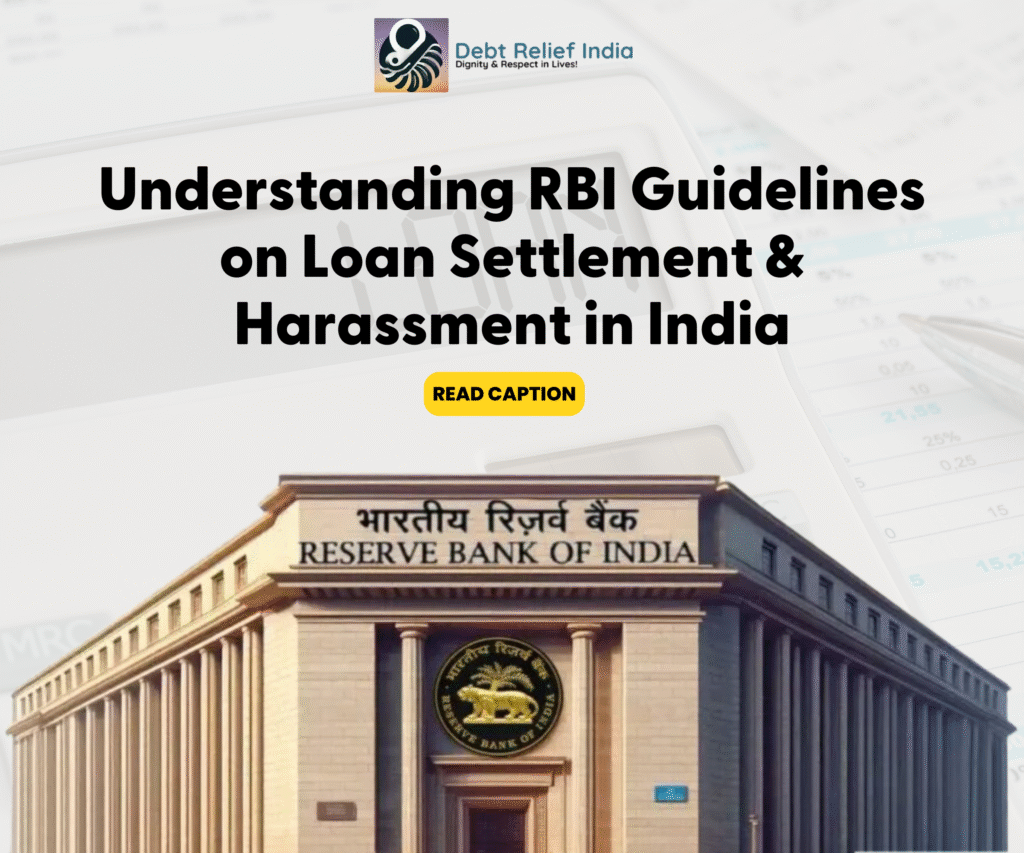Financial struggles are tough but that doesn’t mean you have to tolerate harassment or give up hope. The RBI has laid down clear protections for borrowers, and legal debt resolution is very much possible and for that, you must know the RBI Guidelines on Loan Settlement & Harassment in India
RBI Guidelines on Loan Settlement
The RBI does not prohibit settlements, but it ensures that the process is ethical, transparent & documented. What you need to know:
1. One-Time Settlement Schemes
- Banks & NBFCs are allowed to offer OTS to borrowers in genuine distress.
- The terms must be clearly documented, including the settled amount and payment timeline.
- The lender must issue a ‘No Dues Certificate’ once the amount is paid as agreed.
2. Impact on Credit Score
- RBI mandates that lenders report settlements accurately to credit bureaus.
- Borrowers must be informed that a settlement may affect their ability to borrow in the future.
3. Borrower Rights
- Borrowers have a right to be heard before legal proceedings or asset seizures.
- If the borrower has approached the bank under distress, the lender must evaluate alternative repayment options first such as restructuring before pushing legal action.
- Borrowers must be provided with a written communication regarding any change in loan terms post-settlement.
- Lenders should preserve the privacy and confidentiality of borrowers. Sensitive loan details must not be disclosed to third parties.
- Borrowers are entitled to raise grievances. Lenders must have a grievance redressal mechanism that resolves complaints within a specified time.
RBI Rules Against Harassment by Recovery Agents
Loan recovery is a legitimate activity, but the RBI has issued strict guidelines to prevent threats/abuse.
- Recovery agent behavior – No abusive language, intimidation, or threats and no contact outside approved hours: between 8 AM and 7 PM only.
- Verification of Identity – Recovery agents must carry valid ID cards and authorization letters from the lender.
- Sensitive Cases – In case of senior citizens, women borrowers, or those with medical conditions, lenders must act with extra sensitivity.
- Complaint Channels – Borrowers can file complaints with the Banking Ombudsman, RBI’s Consumer Education and Protection Department, or the police in case of harassment.
Please note: It’s also crucial that all communication with the lender or collection agency is documented. Always insist on written communication/email records. If a settlement offer is made, it must be…
- On the official letterhead of the bank or NBFC
- Signed and stamped by the authorized person
- With clear terms and mention of a “full & final” settlement
Legal & Ethical Alternatives to Deal with Debt
If you’re financially overwhelmed, consider these RBI-recognized solutions:
- Loan restructuring (longer tenure, revised EMIs)
- One-Time Settlement (OTS)
- Debt consolidation
- Approach credit counseling agencies or companies like Debt Relief India for guided settlement without harassment.
RBI guidelines on loan recovery are designed to protect borrowers from harassment and ensure an ethical recovery process. However, violations still occur.
With the support of Debt Relief India, borrowers can navigate complex recovery processes, protect their rights, and resolve financial distress effectively
Book Your Free Consultation Now with Debt Relief India now — India’s first Meta Verified debt settlement company. We help you settle debts with dignity & respect…
